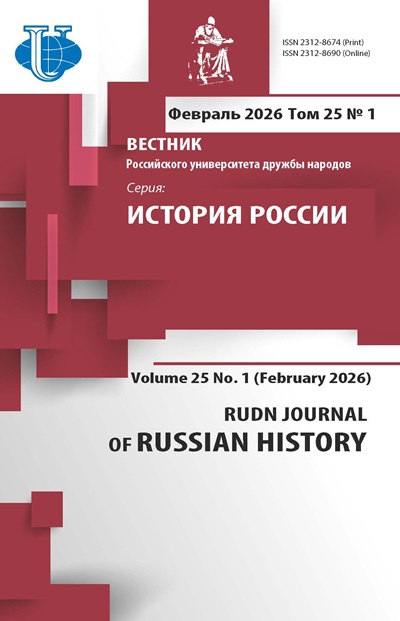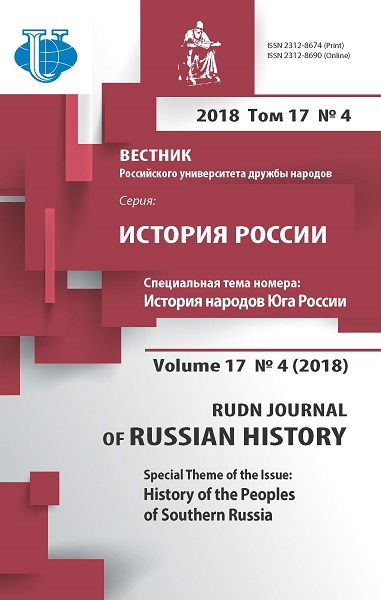Finding teachers for schools in the Southern Urals: training and cadre assignment policies after the Great Patriotic War (1945-1956)
- Authors: Almaev R.Z1
-
Affiliations:
- Bashkir State Pedagogical University named after M. Akmulla
- Issue: Vol 17, No 4 (2018): HISTORY OF THE PEOPLES OF SOUTHERN RUSSIA
- Pages: 914-941
- Section: ARTICLES
- URL: https://journals.rudn.ru/russian-history/article/view/19835
- DOI: https://doi.org/10.22363/2312-8674-2018-17-4-914-941
- ID: 19835
Cite item
Full text / tables, figures
Abstract
The article deals with the state’s educational strategy after the Great Patriotic War. These are actual problems for both domestic and foreign historiography. The author draws on archival and historiographic sources that shed light on how schools were provided with staff in the RSFSR, and particularly in the Southern Urals, during late Stalinism and Khrushchev’s “Thaw”. The paper analyzes the main measures taken by the administrative apparatus of the region to restore the network of higher and specialized secondary educational institutions, and to solve the problem of the lack of teachers. As a result of the comprehensive measures during the first decade after the Great Patriotic War, and with the help of graduates from pedagogical educational institutions, the quality of teachers changed for the better. Many teachers who lacked appropriate education and did not wish to improve their qualification were replaced. The article furthermore studies the reasons for the large turnover rate among teachers. Pedagogical institutes and secondary educational institutions in the Bashkir ASSR as well as in the Kurgan, Orenburg and Chelyabinsk Regions were transformed in accordance with the ongoing social, political and economic changes. The author identifies the factors that influenced the reorganization of the teacher training institutes and the optimization of pedagogical schools in the broader region. The article reconstructs how the Party and State administrative apparatus in charge of Russia’s educational system functioned, and determines the degree of its efficiency. Special attention is paid to the ambiguous demographic processes leading to partial or complete “hidden” unemployment among teachers in 1953-1957. The author concludes that under “regulated bureaucratic pluralism”, the supreme bodies of state and educational administration were unable to rationally use the reserve of teachers in the face of an expected demographic decline.
About the authors
Rustam Z Almaev
Bashkir State Pedagogical University named after M. Akmulla
Author for correspondence.
Email: almaev_history@mail.ru
-
3a Oktyabrskoy Revolutsii St., Ufa, 450000, RussiaReferences
- Abakumov, A.A., Kuzin, N.P., Puzyrev, F.I., and Litvinov, L.F. “O zaochnom obuchenii uchitelei.” [On correspondence education of teachers] In Narodnoe obrazovanie v SSSR. Obshcheobrazovatel’naya shkola. 1917−1973 [Public education in the USSR. Comprehensive school. 1917−1973]. Moscow: Pedagogika Publ., 1974: 437−438 (in Russian).
- Alibaev, S.R. Shkoly Bashkirskoi ASSR (proshloe, nastoyashchee i puti dal’neishego razvitiya) [Schools of the Bashkir ASSR (past, present and ways of further development)]. Ufa: Bashknigoizdat Publ., 1966 (in Russian).
- Almaev, Rustam Z. “Provintsial’nyy uchitel’ Yuzhnogo Urala poslestalinskoy epokhi:
- sotsiokul’turnyy portret.” [Provincial teacher of the Southern Urals after the Stalin era: socio-cultural portrait] In Kul’tura i vlast’ v SSSR. 1920−1950-ye gody: Materialy IX mezhdunarodnoy nauchnoy konferentsii. Sankt-Peterburg, 24−26 oktyabrya 2016 g., 412−422. Moscow: Politicheskaya entsiklopediya; Prezidentskiy tsentr B.N. Yel’tsina Publs., 2017 (in Russian).
- Anaikina, L.I. Stanovlenie sistemy narodnogo obrazovaniya v RSFSR (1922−1991 gg.) [Formation of the public education system in the RSFSR (1922−1991]. Moscow, Nizhnii Novgorod: Begemot Publ., 2000 (in Russian).
- Asadullina, G.A. “Nekotorye aspekty stanovleniya srednego pedagogicheskogo obrazovaniya v BASSR (na primere Mesyagutovskogo bashkirskogo pedagogicheskogo tekhnikuma v 1929−1945 gg.).” [Some aspects of the formation and development of secondary pedagogical education in the BASSR (on the example of the Mesagutovo Bashkir Pedagogical Technical School in 1929−1945)] Vestnik VEGU, no. 2 (2013): 163−167 (in Russian).
- Belova, M.G. Povsednevnaya zhizn’ uchitelei [Everyday Life of Teachers]. Moscow: IEA RAN Publ., 2015 (in Russian).
- Chelyabinskii gosudarstvennyi pedagogicheskii universitet [Chelyabinsk State Pedagogical University]. Chelyabinsk: ChGPU Publ., 2004 (in Russian).
- Danev, A.M. “Ob uluchshenii dela podgotovki uchitelei: Postanovlenie SNK SSSR № 2088 ot 20 avgusta 1945 g.” [On improving the case of teacher training: Decree no. 2088 of the Council of People’s Commissars of the USSR of August 20, 1945] In Narodnoe obrazovanie. Osnovnye postanovleniya, prikazy I instruktsii [Public education. basic orders, orders and instructions]. Moscow: Uchpedgiz Publ., 1948: 375−376 (in Russian).
- Ivanova, G.M. “Social aspects of development of Soviet educational systemin 1950s – 1960s.” Vestnik slavyanskikh kul’tur, no. 3 (2013): 25−31 (in Russian).
- Kabanov, P.I. Istoriya kul’turnoi revolyutsii v SSSR [History of the Cultural Revolution in the USSR]. Moscow: Vysshaya shkola Publ., 1972 (in Russian).
- Kagarlitskii, B.Yu. Byurokraticheskii plyuralizm. Sbornik statei i interv’yu 2006 g [Bureaucratic pluralism. Collection of articles and interviews 2006]. http:// https:// librolife.ru/g4217496 (Accessed at: 30.01.2018) (in Russian).
- Kagarlitskii, B.Yu. Marksizm: ne rekomendovano dlya obucheniya [Marxism: not recommended for training]. https://romanbook.ru/book/3559497/?page=48 (Accessed at: 30.01.2018) (in Russian).
- Kalashnikov, A.G. “Zadachi organov narodnogo obrazovaniya v 1946 godu.” [The tasks of the bodies of public education in 1946] Narodnoe obrazovanie, no. 1 (1946): 37−42 (in Russian).
- Khodyrev, A.M. “Istoricheskie aspekty otechestvennogo obrazovaniya v provintsii.” [Historical aspects of domestic education in the province] In Zlotnikovoi, T.S., Letinoi, T.I., and Novikova, M.V., eds. Model’ kul’tury russkoi provintsii v autentichnom, istoriko-tipologicheskom I globalizatsionnom diskursakh: kollektivnaya monografi ya [Model of Russian provincial culture in authentic, historical-typological and globalization discourses: a collective monograph]. Yaroslavl’: YaGPU Publ., 2013 (in Russian).
- Krivtsova, L.A. “Sel’skoe uchitel’stvo Orenburgskoi oblasti vtoroi poloviny XX veka:
- kolichestvennye i kachestvennye izmeneniya.” [Rural teaching of the Orenburg region in the second half of the 20th century: quantitative and qualitative changes] Izvestiya Orenburgskogo agrarnogo universiteta, no. 11 (2006): 99−101 (in Russian).
- Kul’sharipov, M.M., and Nizamov, A.I. Istoriya Bashkirskogo gosudarstvennogo universiteta [History of the Bashkir State University]. Ufa: BGU Publ., 1997 (in Russian).
- Markelova, L.N. Srednee professional’noe obrazovanie Bashkortostana 1925−1985 gg.: Stanovlenie i razvitie [Secondary professional education of Bashkortostan 1925–1985: formation and development]. Sterlitamak: Sterlitamakskaya gosudarstvennaya pedagogicheskaya Akademiya Publ., 2005 (in Russian).
- Mustafi na, F.Kh. Razvitie vseobshchego srednego obrazovaniya v SSSR (1917−1978 gg.) [The development of universal secondary education in the USSR (1917−1978)]. Ufa: Bashknigoizdat Publ., 1979 (in Russian).
- “Nachalo zanyatii v vuzakh.” [Beginning of studies in universities] In Krasnaya Bashkiriya: September 4, 1945 (in Russian).
- Panachin, F.G. Upravlenie prosveshcheniem v SSSR [Management of Education in the USSR]. Moscow: Prosveshchenie Publ., 1977 (in Russian).
- Panachin, F.G. Ocherki istoriishkoly i pedagogicheskoi mysli narodov SSSR (1941−1961 gg.) [Essays on the historical and pedagogical thought of the peoples of the USSR (1941−1961)]. Moscow: Pedagogika Publ., 1988 (in Russian).
- Pavlishchev, K.S. Narodnoe obrazovanie v SSSR. Sbornik normativnykh aktov [Public education in the USSR. Collection of normative acts]. Moscow: Yuridicheskaya literatura Publ., 1987 (in Russian).
- Polyakov, Yu.A. “Demografi cheskoe ekho’ voiny.” [Demographic echo of the war] In Polyakov, Yu.A., Zhiromskaya, V.B., Aralovets, N.A., and Sevost’yanov, G.N. eds. Voina i obshchestvo, 1941–1945 [War and society, 1941−1945], book 2. Moscow: Nauka Publ., 2004 (in Russian).
- Shageeva, M.Sh. “Uchitel’skie instituty Bashkirskoi ASSR i ikh rol’ v podgotovke pedagogicheskikh kadrov 1930−1950-kh gg.” [Teaching institutes of the Bashkir ASSR
- and their role in the training of pedagogical personnel 1930−1950s] In Istoricheskie, fi losofskie, politicheskie i yuridicheskie nauki, kul’turologiya i iskusstvovedenie. Voprosy teori i ipraktiki [Historical, philosophical, political and legal sciences, cultural studies and art criticism. Questions of theory and practice], no. 12 (2013): 200−203 (in Russian).
- Sovetskaya intelligentsiya. Kratkii ocherk istorii (1917−1977) [The Soviet intelligentsia. A brief history outline (1917−1977)]. Moscow: Gosudarstvennoe izdatel’stvo politicheskoi literatury Publ., 1977 (in Russian).
- Timirgazieva, A.I. “Preparation of national scientifi c personnel in the Bashkir ASSR in 1950−1970-ies.” Vestnik Cherepovetskogo gosudarstvennogo universiteta, no. 1 (2014): 41−45 (in Russian).
- Veselov, V.R. Formirovanie uchitel’skikh kadrov v SSSR: Ucheb. Posobie po spetskursu [Formation of teachers in the USSR: Proc. Special course allowance]. Moscow: MGPI Publ., 1983 (in Russian).
- Yamalov, M.B., and Almaev, R.Z. R.G.Kuzeev (1923−1998). Ufa: Vagant Publ., 2008 (in Russian).
- Yuing, E.T. Uchitelya epokhi stalinizma: vlast’, politika I zhizn’ shkoly 1930-kh gg [Teachers of the era of Stalinism: power, politics and the life of the school of the 1930s]. Moscow: ROSSPEN Publ., 2011 (in Russian).
- Gosudarstvennyi arkhiv Rossiiskoi Federatsii (GARF) [Gosudarstvennyi arkhiv Rossiiskoi Federatsii], f. A-2306, op. 70, d. 9763, 9771.
- GARF, f. A-2306, op. 75, d. 4642.
- GARF, f. A-2306, op. 81, d. 3.
- Tsentr dokumentatsii noveishei istorii Orenburgskoi oblasti (TsDNIOO) [Center for Documentation of the Newest History of the Orenburg Region], f. 371, op. 18, d. 1642.
- Rossiiskii gosudarstvennyi arkhiv noveishei istorii (RGANI) [Russian State Archive of Recent History], f. 5, op. 18, d. 42, 61, 66.
- RGANI, f. 5, op. 29, d. 58.
- RGANI, f. 5, op. 30, d. 185.
- Rossiiskii gosudarstvennyi arkhiv sotsial’no-politicheskoi istorii (RGASPI) [Russian State Archive of Social and Political History], f. 556, op. 16, d. 35.
- Natsional’nyi arkhiv Respubliki Bashkortostan (NA RB) [National Archives of the Republic of Bashkortostan], f. 122, op. 28, d. 582.
- NA RB, f. 122, op. 29, d. 590.
- NA RB, f. 122, op. 32, d. 1976, 1995.
- NA RB, f. 122, op. 66, d. 33.
- NA RB, f. 798, op. 9, d. 14 a, 16, 69, 839.
Supplementary files















